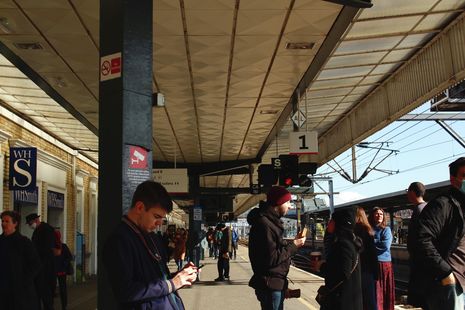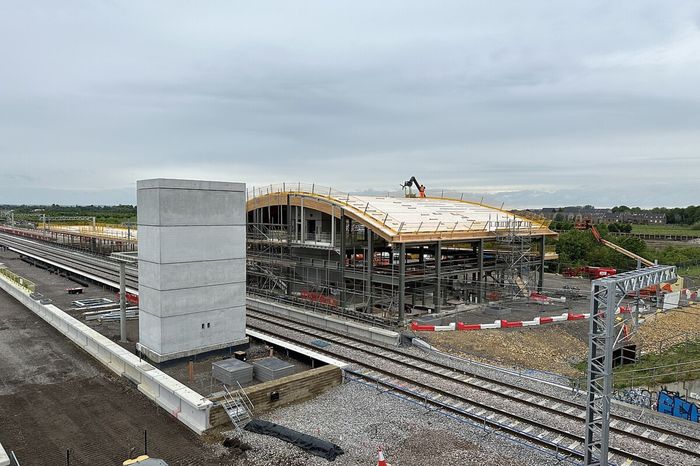All aboard the Varsity line?
Hugh Jones and Jessica Leer collide over the OxCam Arc
Hugh

The accountant’s case for the Oxford-Cambridge arc isn’t hard to make. Doubling Cambridge’s housing stock, rebuilding the old Varsity railway line, and letting techno-capitalist animal spirits rip through the Fens will create jobs and the conditions for innovation. The scheme could be worth almost £80bn to the British economy by 2035, according to Lord Vallance, the science minister.
England’s two ancient universities are among the few parts of this country which are still “world-beating,” to use the obligatory cliché. It is only sensible to make the most of them. America benefits from tech clusters around Boston and San Francisco. By comparison, Oxford and Cambridge don’t add as much to the British economy as they should. They could deliver much more if their most enterprising denizens were allowed to be a little disruptive.
The problem with this accountant’s case, however, is that it will involve trade-offs. In theory, that shouldn’t be a problem. In economics there is something called the compensation principle: if I want to do something that will cost you £50 but gain me £100, then I should be allowed to do it and give you £51 for your trouble. You win, I win, everyone is happy. The catch is that in England, when the compensation is mere money, and the ‘something’ I want to do involves cutting down trees, this neat theorem doesn’t hold up. Even proposing it feels indecent.
“This country is the NIMBY’s spiritual home”
This country invented the “tree preservation order”. Our planning system elevates your grumpiest neighbour to the status of a Roman tribune, wielding an absolute veto over economic activity. We let newts, bats, and owls determine the cost and feasibility of building critical national infrastructure. No, mere compensation won’t cut it.
Ambition, however, might. Yes, this country is the NIMBY’s spiritual home, but it is also the historical home of the industrial revolution. Our national inability to build today is only mitigated by our Victorian ancestors’ delight in erecting houses, sewers, and railways. Even Cambridge, famous for its medieval buildings, is covered in Victorian laboratories, lecture theatres, even whole colleges.
We need that ambition again. We should build the Oxford-Cambridge arc not merely because it will create jobs and boost tax revenues but because it will create opportunities, for human flourishing in those new jobs, for discoveries in newly-built laboratories, for families in new homes.
Cambridge, even in its pre-Victorian manifestations, embodies this ambition. The noble families who endowed its colleges with a mandate to pray for their souls could not have expected that those colleges would host the discovery of DNA or the development of Keynesian economics. They could, however, have hoped that their endowments would bear fruit of some kind, far into the future, long after their deaths.
It is in this spirit that I endorse the Oxford-Cambridge arc. If bloodless financial projections are not enough to convince you of its merits, think of the as-yet-unconceived good that will come from the project. Think of the compounding opportunities, shooting forward over the decades, created by the laying of track and construction of homes.
The act of building is optimistic. It invests the resources we have today in our descendants and future selves, in the confidence that they will put what we give them to good use. Embracing that optimism is worth some sacrifice today – even if that sacrifice involves a few lost trees.
Jessica
Looking at the Oxford-Cambridge Arc through an architectural lens, it is not hard to find the scheme greatly flawed. One of the first things you learn when studying architecture is that the most sustainable building strategy is not to build at all. Although that is highly utopian, and in a growing economy not at all possible, I question whether a scheme on this large a scale is needed to provide new jobs or housing.
My concern lies with the funding of new and ‘innovative’ schemes that ignore many of the social and environmental issues we are facing. There are areas left in deprivation, needing to be retrofitted or reestablished, in places that are already built-up. We often hear about the decline of the high street or the vacancy of towns, so why not build those areas up instead? Consider the environment and the loss of green space within the UK – do we really need more grey belt in the South East?
As a fan of a train expedition across the country, I will admit that re-opening the Varsity railway seems appealing. Yet local people have already lobbied against East West Rail going through certain areas at risk of losing biodiversity. While EWR is working with the rural townsfolk and promises jobs, its construction is only a short-term scheme bringing temporary benefits, with its longer-term ones threatened by a lack of completion, since the UK doesn’t exactly have the best track record for correctly estimating how much their schemes cost.
“Is scheme on this scale needed to provide new jobs or housing”
New housing projects are already in motion in the Unitary Authority, the counties connecting Oxford and Cambridge. Bedfordshire has had new projects that have lacked care in their design, new housing and industry that are only connected by roads, rather than public transport. A lot of these schemes promise housing and jobs but disregard the deeper issues regarding facilities – areas of Bedford have been developed with no schools. I do not think a singular railroad will fix the ‘issues of connection’ that the Cambridge-Oxford Arc aims to do.
If this is the lack of care we have on our smaller schemes, I think it’s clear that a larger scheme spanning five counties will not care about the rural lives it will change. Perhaps I am being pessimistic – there is a chance that the scheme works around the current lives of the area without upending them for some capitalist dystopia. But, judging by the current backlash, it’s clear that dwellers of areas impacted by EWR do not want something ‘new’ or ‘innovative’, what they want is their lives left undisturbed.
The act of building is not optimistic; in the UK it is wasteful and uncaring. A quarter of the UK’s carbon emissions come from buildings. Construction strategies mean that we overuse concrete and materials in every project; a large-scale project like this would only worsen it. It is unrealistic to think that the UK will have developed sustainable construction methods before construction takes place, resulting in excessive use of materials and high emissions from transportation.
For years, we have disregarded the environment for economic development. I wonder at what point we will stop. When we finally do, what will be left of the people and environments we have harmed?
 News / Colleges charge different rents for the same Castle Street accommodation2 March 2026
News / Colleges charge different rents for the same Castle Street accommodation2 March 2026 News / News in Brief: waterworks, wine woes, and workplace wins 1 March 2026
News / News in Brief: waterworks, wine woes, and workplace wins 1 March 2026 News / Climate activists protest for ‘ethical careers policy’1 March 2026
News / Climate activists protest for ‘ethical careers policy’1 March 2026 News / Angela Merkel among Cambridge honorary degree nominees27 February 2026
News / Angela Merkel among Cambridge honorary degree nominees27 February 2026 News / Private school teacher who lied about Cambridge degree barred from teaching27 February 2026
News / Private school teacher who lied about Cambridge degree barred from teaching27 February 2026









